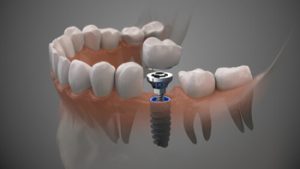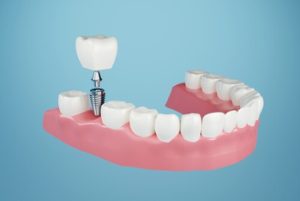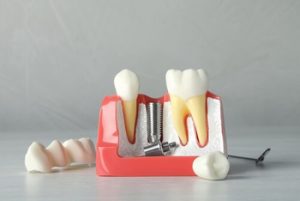Dental health takes precedence in the quest for a radiant, confident smile. Among the various advancements in dental care, dental implants stand out as a superior solution for replacing missing teeth. However, the cost associated with this procedure often causes hesitation. This blog delves into the realm of affordable dental implants, offering insight into how these marvels of dental technology can be accessible without compromising on quality.
Understanding Dental Implants
Dental implants are designed to replicate the function and appearance of natural teeth. These implants are surgically placed in the jawbone, serving as a sturdy foundation for artificial teeth. Over the years, integrating the implant with the jawbone—a process known as osseointegration—ensures a stable and durable solution for missing teeth.
The Composition of a Dental Implant

- The Implant: A titanium post that acts as a root for the new tooth.
- The Abutment: A connector that supports and holds a tooth or set of teeth.
- The Crown: The visible part is custom-made to match your natural teeth, enhancing aesthetic appeal and functionality.
The Dental Implant Procedure
Replacing missing teeth with dental implants involves a meticulous and multi-phased approach. Each stage of the procedure is crucial for ensuring the longevity and effectiveness of the implants. Below, we detail the procedure from initial consultation to final placement and ongoing care, ensuring you understand what to expect during dental implant treatment.
Initial Consultation
The first step in obtaining dental implants involves a comprehensive assessment with your dental professional. During this consultation, your dentist will conduct a detailed examination of your oral health, which includes X-rays or 3D images to assess the density and health of your jawbone. This stage is vital as it helps determine your suitability for tooth implants. Factors like oral hygiene, general health, and chronic diseases will be evaluated.
Treatment Planning
Once you are deemed a suitable candidate for dental implants, the next step is creating a personalised treatment plan. This plan considers factors such as the number and location of missing teeth and the condition of your jawbone. Your dentist might discuss various types of implants, such as single-tooth dental implants or full-arch replacements. Here, you can also discuss the cost aspects, exploring options for cheap dental implants without compromising quality.
Preparation
Some patients may require preparatory procedures before placing the implants. These can include tooth extractions, treatment of gum disease, or bone grafting to enhance jawbone strength and density. Bone grafting is necessary if the jawbone is too soft or thick to support the implant securely.
Implant Placement
The actual installation of the dental implant is a surgical process carried out under local anaesthetic, and it is frequently characterised as less painful than tooth extraction. During this step, the dentist makes a tiny incision in the gum to reveal the bone. Holes are bored into the bone to instal the dental implant, which is a titanium post. This post serves as a replacement root for your prosthetic tooth. After the implant is implanted, the region can heal—which might take many months. During this period, osseointegration occurs, in which the jawbone develops around the implanted metal post, firmly fixing it in the jaw.
Healing and Bone Integration
The healing phase is crucial because it helps the implant to integrate into your bone. It is essential to get your dentist’s advise on the dentist’s diet at this time to guarantee good recovery. Patients are often advised to eat soft meals and avoid placing pressure on their new implants. Osseointegration is the process by which the dental implant integrates with your jawbone.
Abutment Placement
Once the implant has bonded with the jawbone, the next step involves placing the abutment. This procedure might require reopening the gum to attach the abutment to the dental implant. The abutment is the piece where the crown will eventually attach. After the abutment is placed, the gum tissue is closed around it but not over it. This procedure typically is less invasive and requires a shorter healing period.
Choosing the Right Artificial Tooth

Placement of the Crown
Once the crown is ready, it is attached to the abutment. It might take several fittings to ensure the implant is placed correctly and comfortably. Once fitted, the crown is either screwed or cemented into place, completing the process of replacing your missing teeth.
Post-Procedure Care
Following the placement of your dental implants, good oral hygiene and regular dental visits are crucial for maintaining the health of your implant, surrounding teeth, and gums. Proper care ensures the longevity of the implant and overall oral health.
Benefits of Dental Implants Over Other Solutions
Dental implants are widely recognised as a superior solution for replacing missing teeth, primarily due to their durability, functionality, and ability to integrate seamlessly with natural dental structures. This comprehensive analysis will explore why dental implants, through a detailed dental implant process, provide more advantages over traditional methods like dentures or bridges.
Preservation of Jaw Bone Integrity
One of the most significant benefits of dental implants is their ability to preserve and protect the jaw bone. When a tooth is lost, the area of the jaw bone that supports the tooth begins to deteriorate over time—a process known as bone resorption. Dental implants act as artificial tooth roots and are inserted directly into the jaw bone, providing the necessary stimulation to keep the bone intact and active. This stimulation helps maintain the strength and shape of the jaw, a benefit not provided by surface-level solutions like dentures.
Integrating the implant with the jaw bone, a process known as osseointegration, is pivotal in this context. High-quality dental implants are designed to fuse with bone, thus providing a stable and permanent base for the artificial tooth. This not only helps preserve the jaw bone but also ensures the stability and longevity of the implant itself.
Enhanced Functionality and Comfort
Dental implants restore full chewing power. Most patients can tell the difference between natural and implant teeth. They can eat with it completely normally, and they can brush and floss normally as well. This starkly contrasts options like dentures, which can limit the ability to chew certain foods and often require adjustment or special maintenance.
The functionality extends beyond eating and cleaning. Dental implants are anchored securely in your jaw so they won’t slip or move. This stability makes speaking easier and more natural than other treatments that can slip within the mouth, causing slurred speech or clicking noises.
Protection of Adjacent Teeth
The gap from a missing tooth can cause adjacent teeth to shift, eventually leading to misalignment. Dental implants fill this gap, allowing you to maintain a straight, even smile. This advantage over a bridge requires adjacent teeth to be filed down to support the bridge. By preserving the structure of adjacent teeth, dental implants prevent the alteration of your natural teeth, maintaining more of your teeth intact, which is beneficial for your long-term oral health.
Aesthetic Superiority and Confidence
Dental implants look, feel, and function like natural teeth. High-tech imaging and colour-matching technology ensure that the dental implant crown perfectly matches the colour of your existing teeth for a seamless appearance. This natural look contributes significantly to confidence levels, especially compared to alternatives like dentures, which can look artificial and require adhesives to stay in place.
Additionally, implants are designed to fuse with bone, so they provide a permanent solution that doesn’t shift or require removal for cleaning, which can make a big difference in appearance and comfort.
Longevity and Reliability
While the initial cost of dental implants might be higher than other tooth replacement options, their durability and low maintenance requirements make them a more cost-effective solution over the long term. Dental implants can last a lifetime with proper care, unlike dentures and bridges, which may need to be replaced every 5 to 10 years. This aspect, combined with the reduced need for future dental work on adjacent teeth and the lack of adhesive need, results in a more straightforward, less invasive approach to dental care.
Health Benefits
Dental implants help prevent several health issues associated with tooth loss, including the deterioration of the facial structure and difficulties with eating, which can lead to poor nutrition. By maintaining the health and density of the jaw bone and supporting a natural bite and chewing ability, implants contribute to better overall oral and general health.
Versatility
Dental implants are extraordinarily versatile. They can be used in cases where single or multiple teeth are missing, with solutions ranging from single-tooth to full-mouth implants. The procedure can also be tailored to individual needs, whether replacing one tooth or several. Each implant is independent and does not rely on neighbouring teeth for support, making this a versatile and generally applicable treatment for tooth loss.
Considering all these factors, it is clear why dental implants are often the preferred choice for replacing missing teeth. They offer significant health, aesthetic, and functional benefits and contribute to long-term oral health maintenance, making them a sound investment in your overall well-being. For those concerned about the costs, discussing options for financing and cost management with a reputable provider can make this invaluable treatment accessible.
Factors Affecting the Costs of Dental Implants
The phrase “affordable dental implants” is often questioned due to the perceived high cost of dental implants. However, several factors can influence the dental implants cost, making them more accessible than ever:
- Materials Used: Advances in technology have made the materials more cost-effective.
- Treatment Plans: Customised plans can be adjusted based on budget and need.
- Payment Plans: Many dental practices offer financing options to spread out the dental implant costs.
Starting Dental Implant Cost in Australia
In Australia, the cost of dental implants can vary widely based on various factors, including the clinic’s location, the dental surgeon’s expertise, and the patient’s specific needs. However, for those considering this treatment, understanding the baseline costs can help in planning and decision-making. Generally, the starting cost for a basic dental implant in Australia can range from approximately $3,000 per tooth. This estimate typically includes the surgical placement of the implant and the dental implant crown itself.
The Role of the Australian Dental Association
The Australian Dental Association (ADA) provides guidelines and standards for dental implant treatments, ensuring they meet high safety and quality standards. Choosing a dentist who adheres to these guidelines is crucial for a successful outcome.
Choosing the Right Dental Implant Provider
When considering dental implant treatment, selecting the right dental professional is critical. Look for clinics that offer:
- Transparency in Pricing: No hidden fees or surprises.
- Experience: Skilled dental professionals who specialise in implantology.
- Quality Materials: Use of high-quality, durable implant materials.
- Patient Testimonials: Positive feedback from previous patients.
Why Choose Infinity Dental Care for Your Dental Implants?

Are you ready to restore your smile with high-quality, affordable dental implant procedures? Contact Infinity Dental Care at (02) 9159 6237 to schedule your consultation today. Don’t let the gap in your smile hold you back any longer—take the first step towards a confident, radiant smile with us!
Note: Any surgical or invasive procedure carries risks. Before proceeding, you should seek a second opinion from an appropriately qualified health practitioner.
References:
https://www.dentalhealth.org/dental-implants
https://www.forbes.com/health/dental/how-much-dental-implants-cost/

